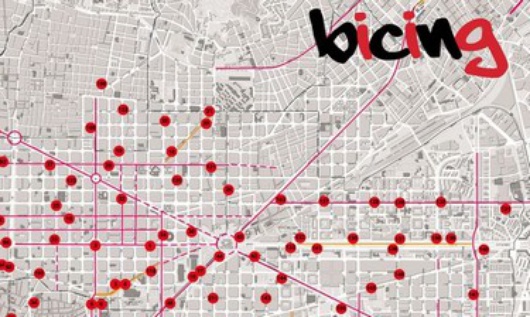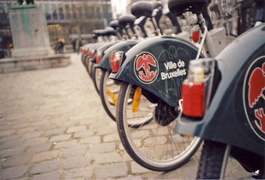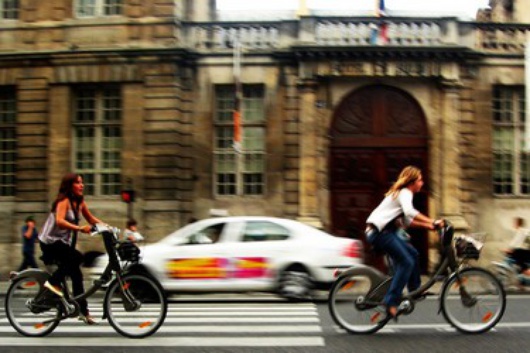
After JC Decaux’s Vélib’, 6, 000 bicycles for London
Published on
Translation by:
Susannah Readett-BayleyIts recent success in the public bicycle market has led the French advertising giant into a race against competitors to secure the multiplying contracts popping up all over Europe
Vélib’, Servici, bicloo, velov’, cyclocity, bicing... Public rental bicycles now come in all shapes and sizes. You could even go as far as to say that this mode of transport is becoming part of a European city's compulsory infrastructure. Brussels, Seville, Cordova, Vienna, Paris, Barcelona, Stockholm and Oslo are already equipped, but considerable economic interests lie behind these bicycle stations that provide the city user with a cheap mode of transport. It’s a veritable commercial war fought with legal weapons.
 The word ‘free’ often masks lucrative economic markets. Seriously challenged by its world competitor, the US-based Clear Channel, JC Decaux is moving up a gear and innovating. The company offers public bicycle networks in return for the use of advertising boards. The deal appears to be persuading city councils, with the French capital as a prime example. On 3 October 2007, satirical French daily Le Canard enchaîné (‘The Chained Duck’) revealed figures from the ten year contract signed between Paris’ city council and Decaux: 20, 600 bicycles, 35, 000 stations and 2.4 million euro of income for the town hall, in return for the use of 1, 628 advertising boards until 2017.
The word ‘free’ often masks lucrative economic markets. Seriously challenged by its world competitor, the US-based Clear Channel, JC Decaux is moving up a gear and innovating. The company offers public bicycle networks in return for the use of advertising boards. The deal appears to be persuading city councils, with the French capital as a prime example. On 3 October 2007, satirical French daily Le Canard enchaîné (‘The Chained Duck’) revealed figures from the ten year contract signed between Paris’ city council and Decaux: 20, 600 bicycles, 35, 000 stations and 2.4 million euro of income for the town hall, in return for the use of 1, 628 advertising boards until 2017.
Legal battle
 At the same time, JC Decaux have managed to seduce local authorities and ecology protagonists whilst assuring themselves a solid financial future. The Paris Vélib’ (velo libre meaning ‘free bike’) stations are not modular. In other words, JC Decaux alone can produce stations that are compatible with the current city centre stations. This goes against every European rule of free competition because neighbouring towns can’t launch a call for tender for the provision of a similar public bicycle service.
At the same time, JC Decaux have managed to seduce local authorities and ecology protagonists whilst assuring themselves a solid financial future. The Paris Vélib’ (velo libre meaning ‘free bike’) stations are not modular. In other words, JC Decaux alone can produce stations that are compatible with the current city centre stations. This goes against every European rule of free competition because neighbouring towns can’t launch a call for tender for the provision of a similar public bicycle service.
Clear Channel are demanding that the city council launch a new call for tender. But the Conseil d’Etat (council of state) have not heard the arguments about free competition. On 11 July 2008, the highest level of French administrative jurisdiction authorised an extension of the Vélib’ network to a further 1.5 kilometre radius surrounding Paris. This decision overrules a judgement taken by Paris’s administrative court on 2 January 2008.
A concept with several flaws
 Despite the fact that the idea is initially an attractive one, it wears off over time; all the users tend to go in the same directions at the same times. As a result, in the morning all the central stations are full and the outer stations are empty and it becomes difficult to find a place to leave your bicycle. The problem is the inverse in the evening. To remedy this, the bikes are transported around by trailer. Take the example of the top of Lyon's district of Fourvière; all the Velov’ gather at the bottom of the hill and no one is brave enough to attempt the ride back up to the top.
Despite the fact that the idea is initially an attractive one, it wears off over time; all the users tend to go in the same directions at the same times. As a result, in the morning all the central stations are full and the outer stations are empty and it becomes difficult to find a place to leave your bicycle. The problem is the inverse in the evening. To remedy this, the bikes are transported around by trailer. Take the example of the top of Lyon's district of Fourvière; all the Velov’ gather at the bottom of the hill and no one is brave enough to attempt the ride back up to the top.
In Libération newspaper on 8 October 2007, Pierre-Yves Geoffard, a researcher at CNRS (National Center for Scientific Research), suggested that users going against the flow could be rewarded by some kind of bonus. ‘Taking a bicycle from a station that is full should be cheaper than taking one from a nearly empty station; leaving a bicycle in a station that is almost full should cost more than in an empty station.’ It’s one way of rewarding the good cycling citizen’s efforts.
Translated from L'Europe : un vélibozore affamé



